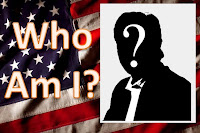 I'll admit, I tried to lead you all down the garden fence with yesterday's competition - but I'm still surprised nobody got it.
I'll admit, I tried to lead you all down the garden fence with yesterday's competition - but I'm still surprised nobody got it.The answer wasn't Barack Obama, despite the similarities with the quotes and policies I highlighted.
The answer to 'Who Am I?' is actually 31st President of the United States: Herbert Clark Hoover.

For a guy who's been dead for almost half a century, old 'Wonder Boy' Hoover has been getting a lot of column inches in the press recently: I'm not the only one who sees spooky similarities between his stratospheric rise to power and the career of modern wunderkind Barack Obama.
The criticisms Hoover's detractors made against him are also awkwardly similar to the attacks conservatives are currently making against Obama.
"There could not a be a finer candidate for President." So said Democrat Franklin D. Roosevelt, of the brilliant Hoover when he considered running for office in 1919. In the end, though, Hoover rejected joining the Democrat party, admitting he "couldn't run for a party whose only member in his boyhood home had been the town drunk."
Herbert Hoover became a registered Republican (although not above ditching the party for political expediency) but certainly didn't act like one, if you'd judge him by today's standards.
Hoover believed that government had a role in everything - and he had a role in just about every government department. The last president to have ever held a cabinet position before his election, the bossy, opinionated and forceful Hoover, pre-White House, defined his position as; "the Secretary of Commerce... and Under-Secretary of Everything Else."
He was a brilliant man with a forceful personality and when he finally ran for election, on the 1928 Republican ticket, his popularity was similar to Obama's in the 2008 election.
For example, if you think the media was biased towards Obama, think what rival Frank Lowden thought whenever he opened a newspaper: "They're full of of nothing but advertisements for Herbert Hoover."
Back in 1928, the south was as politically itinerant as always - but favored the Democrats (what had been the pro-slavery party) instead of today's Republicans. Hoover performed astonishing 'Obama-like' upsets by winning traditionally Democratic states like Florida, North Carolina, Virginia, Texas and Tennessee.
When he entered the White House after his triumphant victory, he boasted: "We in America today are nearer to the final triumph over poverty than ever before in the history of any land."
He said that just months before the Great Depression.
Hoover's Failure. Obama's Opportunity.
The reason so many people spot similarities between Herbert Hoover and Barack Obama is because they both found themselves facing the greatest economic crisis in their generation's history. It was Hoover's greatest failure. Conservatives today warn that Obama could follow in his footsteps.
Herbert Hoover's attempts to stop to U.S. economy circling the toilet-bowl included slapping tariffs on imported goods - which slewed exports to a halt and crippled the economy still further.
Then, as employment reached nearly 25% and the government found itself practically bankrupt, Hoover attempted to rescue the budget by overturning his treasury's popular tax cuts: That sent the top-level of taxation to an almost unprecedented peace-time rate of 73%.
Hoover matched these tax hikes with an explosion of spending, which Franklin D. Roosevelt described as "reckless and extravagant." The 1932 Emergency Relief and Construction Act attempted to ease unemployment by providing construction jobs, building public works across the country. In fact, all it did was contract the economy still further.
Modern-day Republicans might find it astonishing that one of their party is so famous for spending and taxing too much, increasing national debt, raising tariffs and blocking trade, as well as placing millions on the government payroll. Conservatives attack Obama with the same accusations levelled at Hoover, such as Roosevelt's would-be Vice President accusing Hoover of "leading the country down the path of socialism."
In fact, Franklin D. Roosevelt would surpass all of Hoover's government intervention when he lead America out of the Great Depression - and the foundations of The New Deal were laid firmly during Herbert Hoover's administration.
Roosevelt quietly proved that Hoover's greatest failing wasn't in spending too much government money in order to help the economy recover. It wasn't spending nearly enough.
Nevertheless, with 25% unemployment and nationwide poverty serving as the backdrop to the 1932 election, it was unsurprising that Hoover lost. When Franklin D. Roosevelt took the oath of office, Herbert Clark Hoover was generally considered; "the most hated man in America."
So here we are, 76 years later. In many ways, the script is the same, just with different actors taking the lead roles. George W. Bush is leaving office with dismal approval ratings and a legacy of Free Market Economics gone sour. As Barack Obama steps in to fill his shoes, it'll be up to him whether he's going to follow the route Herbert Hoover took, or emulate the legendary success of Franklin D. Roosevelt.

It's moments like these that make me so glad to have studied and maintained an interest in history. Liberal or conservative, I think it's always important to remember the words of poet and philosopher George Santayana:
'Those who cannot remember the past are condemned to repeat it.'

2 comments:
ooooh la la! Aren't you smart!!! Most interesting! Actually, I have heard others comparing Obama to Hoover but did not know that the similarities went so far as to how people referenced them.
Good Job!!!
Hoover sucked. ;-)
Post a Comment